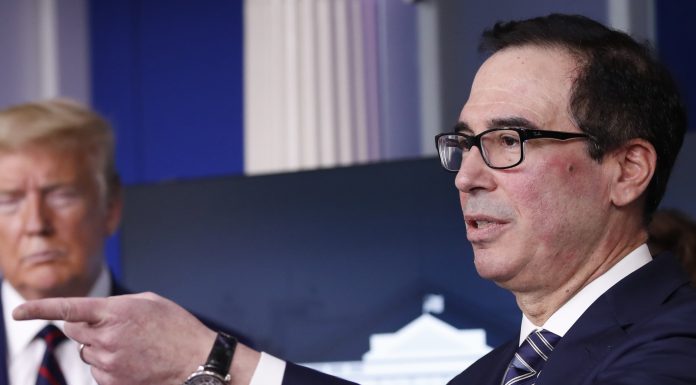(Headline USA) President Donald Trump on Wednesday tried to salvage a few priority items lost in the rubble of COVID-19 relief talks that he himself blew up after pulling out of the bad-faith negotiations with Democrat leaders.
In a barrage of tweets, Trump pressed for passage of core components in the latest economic stimulus package after earlier saying he would end talks with House Speaker Nancy Pelosi for the time being.
Trump called on Congress to send him a “Stand Alone Bill for Stimulus Checks ($1,200)”—a reference to a preelection batch of direct payments to most Americans that had been a central piece of negotiations between Pelosi and the White House.
“I am ready to sign right now. Are you listening Nancy?” Trump said on Twitter Tuesday evening.
He also urged Congress to immediately approve $25 billion for airlines and $135 billion for the Paycheck Protection Program to help small businesses.
Pelosi has rejected such piecemeal entreaties all along, while the White House has refused to consider many of the partisan wish-list items included in House Democrats’ more than $2 trillion bill.
The California Democrat pushed for radical changes to the upcoming election, even as it is already in progress in many places.
The bill also included funding for insolvent Democrat-run cities that have refused to cut their own budgets while demanding federal funds to maintain wasteful spending programs and other fiscal abuse.
After the call to pull out of the talks until after the election caused stocks to drop on Tuesday, Trump’s tweets seemed to move the financial markets into positive territory.
However, questions linger as to whether either side will face any political fallout in the waning weeks before the Nov. 3 election.
Trump’s decision to scuttle talks between Treasury Secretary Steven Mnuchin and Pelosi came after the president was briefed on the landscape for the negotiations—and on the blowback that any Pelosi–Mnuchin deal probably would have received from his GOP allies in Congress.
“It became very obvious over the last couple of days that a comprehensive bill was just going to get to a point where it didn’t have really much Republican support at all,” White House chief of staff Mark Meadows said Wednesday on Fox News.
“It was more of a Democrat-led bill, which would have been problematic, more so in the Senate than in the House,” he said.
Pelosi told reporters that “all the president wants is his name on a check” for direct aid payments.
Many Republican senators had signaled they would not be willing to go along with any measure that topped $1 trillion, and GOP aides had been privately dismissive of the prospects for a deal. Any Pelosi-sponsored agreement of close to $2 trillion raised the potential of a GOP revolt if such a plan came to a vote.
Pelosi and Mnuchin talked briefly on Wednesday morning about the chances for a stand-alone airline rescue, Pelosi spokesman Drew Hammill tweeted.
Pelosi directed Mnuchin to a measure she had attempted to pass on Friday on short notice under fast-track procedures, but only after Democrats made a number of changes Republicans did not like.
The talks have been troubled from their start in July and never appeared to close in on an agreement both sides could embrace.
Pelosi had been demanding a host of Democratic priorities on food aid, unemployment benefits, help for renters and homeowners, and aid to state and local governments.
Republicans charged she was dragging the talks to deny Trump a political victory before the Nov. 3 election.
Early rounds of virus aid passed by overwhelming margins as the economy went into lockdown in March. After that, Trump and many of his GOP allies focused on loosening social and economic restrictions as the key to recovery instead of more taxpayer-funded help.
Still, the decision to halt negotiations now could be politically perilous. While the stock market has clawed much of its way back after cratering in the early weeks of the crisis, unemployment stands at 7.9%, and the nearly 11 million jobs that remain lost since the start of the pandemic exceed the number that the nation shed during the entire 2008-09 Great Recession.
The economy has recovered more quickly than most economists had expected, largely because of the aid Congress approved in a $2 trillion package in March. The $1,200 stimulus checks, supplemental $600 unemployment benefits each week, and aid to small businesses boosted household incomes and enabled many low-income Americans to pay bills and rent and maintain their overall spending, according to data from Opportunity Insights.
But the recovery has slowed and certain sectors such as restaurants, hotels, theaters and airlines remain in bad shape, shedding jobs and risking permanent realignment. Without more stimulus, economists expect growth will slow significantly in the final three months of the year.
“You’re going to see quite a significant drag on growth,” said Gregory Daco, chief U.S. economist at Oxford Economics, a consulting firm. It “would really risk a double-dip recession.”
Adapted from reporting by the Associated Press

